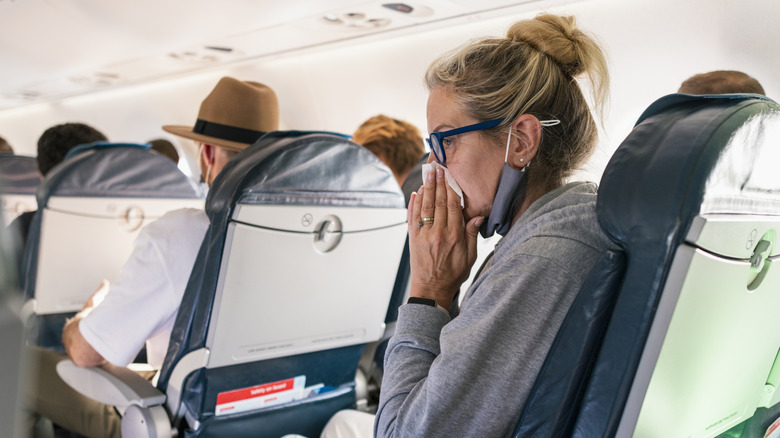Here's Why You Keep Getting Sick After Traveling
Travel can be revitalizing, but some of us find ourselves sneezing instead of celebrating at the end of a trip. If, despite your best attempts to avoid catching a cold while traveling, you keep finding yourself getting sick, a few different factors could be to blame. It may be something that happened on the trip that left you feeling off — whether that's jumping from climate to climate, sleep and diet changes, or being confronted with germs that your body isn't used to. It could also be the travel itself; after all, it's easy to catch colds on flights, and they may leave you exhausted in and of themselves.
Ironically, some very stressed people may even be more likely to get sick when they get the chance to relax — which could be when they finally get to take a break and kick back on vacation or when they stop rushing from one destination to the next and return home. There's some debate about whether people who experience this phenomenon are dealing with a physical weakening of the immune system due to chronic stress, anxiety over missed work, or something else entirely. However, one thing is certain: If you feel like you always get sick after a trip, you're not alone.
Why you might feel sick after visiting a new place
One of the best things about travel is throwing yourself into an entirely new environment, trying new things, and experiencing new places. Unfortunately, your body may not always be as enthusiastic about those changes as you are. While it might sound luxurious to leave harsh winter temps for a balmy beach, rapidly going from one climate to another can also take a toll on your body. Although some might be able to use jet lag to their advantage to reset their sleep schedule, not getting enough sleep while you are away can make you feel sick after the trip is over. Whether vacation means staying up late, rushing between landmarks, or trying an array of different foods, those changes can leave you feeling off when you get home.
Going to new places can also unfortunately mean exposing yourself to new germs which your body has less resistance to. If you don't take precautions like masking up in crowded indoor spaces and washing your hands often, you may find yourself bringing back a traveler's cold. Just like at home, if you're not careful about what and where you eat, you might catch a stomach bug while traveling, too. Most of the time, these frustrating symptoms will clear up on their own, but if they don't go away or you develop a fever, it's a good idea to talk to a doctor and let them know about your traveling circumstances.
Why travel itself could make you feel sick
If you wake up the day after your trip feeling sick, it's not necessarily the destination that's to blame — it could be the flight. For many people, physically traveling from one place to another can be draining. In fact, you don't even have to go very far to feel sick the day after being in transit. Many road trip passengers experience travel fatigue due to experiencing motion sickness. While you might usually enjoy car trips, after a long time, the constant motion can add up to some serious feelings of unease once the trip is over.
If you take a flight, however, the conditions in the plane or the airport could also be to blame. Not only are some airports incredibly stressful, like North America's Toronto Pearson, but jet lag can also give you unpleasant stomach symptoms and leave you feeling overstimulated and fatigued afterward. Airplanes are chilly, dry places, which can be very irritating to your nose and throat, especially on long flights.


